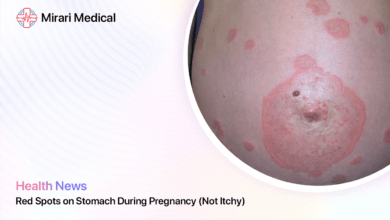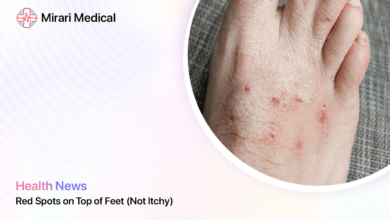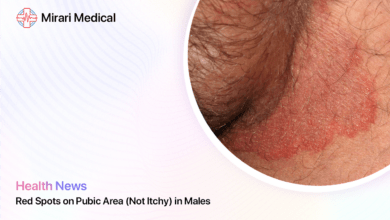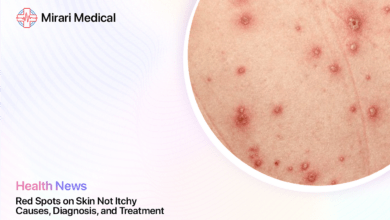Itchy Skin at Night with Bumps on Skin
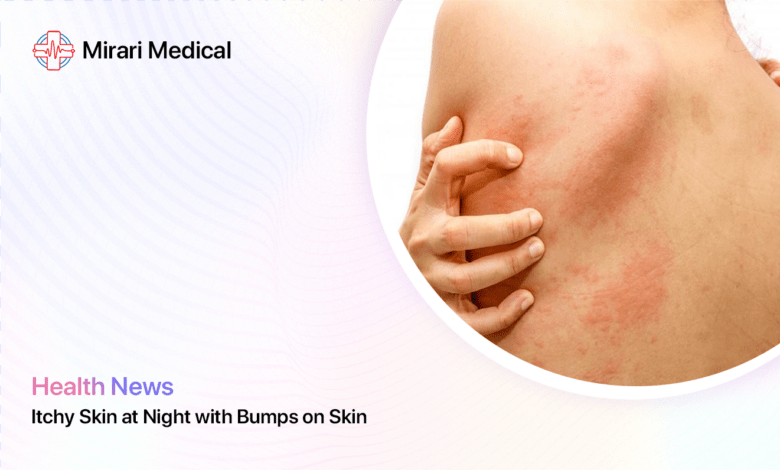
If you’ve ever woken up in the middle of the night with itchy bumps on your skin, you know how frustrating and uncomfortable it can be. Nighttime itching with bumps is a common problem that can have many different causes. In this article, we’ll explore the symptoms, possible causes, and treatment options for dealing with itchy skin at night with bumps.
Symptoms of Nighttime Itchy Skin with Bumps
The main symptoms of this condition include:
- Worsening itch at night, often severe enough to wake you from sleep
- Itchy bumps on the skin that may be red, swollen, or filled with fluid
- An itchy rash with bumps that spreads or appears on different parts of the body
- Increased scratching at night, which can damage the skin and lead to bleeding or infection
Nocturnal itch with bumps can significantly impact sleep quality. The constant urge to scratch can lead to sleep-disrupting itch with bumps that leaves you feeling exhausted during the day. Children and adults of all ages can experience itchy bumps worse at night.
Possible Causes of Itchy Skin at Night with Bumps
There are many potential causes of nighttime flare-ups of itchy bumps, including:
Atopic Dermatitis (Eczema)
Atopic dermatitis, also known as eczema, is a chronic skin condition that causes dry, itchy, inflamed skin. It often begins in childhood but can occur at any age. Eczema symptoms tend to come and go, with flare-ups that can be triggered by irritants, allergens, stress, and changes in temperature or humidity.[1]
Nighttime itching is a hallmark symptom of atopic dermatitis. The skin may be covered in itchy bumps that are red, rough, and scaly. Scratching can cause the bumps to ooze and crust over. Eczema often affects the face, hands, feet, and creases of the elbows and knees, but it can appear anywhere on the body.
Psoriasis
Psoriasis is an autoimmune condition that causes skin cells to grow too quickly, resulting in thick, scaly patches that can be itchy and painful. Like eczema, psoriasis tends to go through cycles of flare-ups and remission. Stress, infections, skin injuries, certain medications, and cold weather can all trigger psoriasis symptoms.[2]
Psoriasis may worsen at night, leading to itchy bumps on the skin that can disrupt sleep. The bumps are often covered in silvery-white scales and can appear on the scalp, elbows, knees, and lower back. Scratching can cause the plaques to thicken and bleed.
Hives
Hives, also known as urticaria, are itchy welts that can appear suddenly on the skin. They may be triggered by an allergic reaction to foods, medications, insect stings, or other irritants. Hives can also be caused by infections, stress, or autoimmune disorders.[3]
Hives often appear suddenly and can be very itchy, especially at night. The welts can range in size from small spots to large blotches and may move around on the body. Some people develop itchy bumps with red spots that resemble mosquito bites. Hives usually go away within 24 hours, but new welts may continue to appear for days or weeks.
Insect Bites and Bed Bugs
Insect bites, particularly from mosquitoes and mites, can cause itchy bumps on the skin that are more noticeable at night. The bumps are usually small, red, and swollen, with a central bite mark. Some people may have a more severe allergic reaction to insect bites, with larger welts or hives.[4]
Bed bugs are another common cause of nighttime itchy bumps. These tiny insects hide in mattresses, bedding, and furniture during the day and come out to feed on blood at night. Bed bug bites often appear in clusters or lines on exposed areas of skin, such as the face, neck, arms, and hands. The bites are very itchy and can take several days to heal.
Heat Rash
Heat rash, also known as prickly heat or miliaria, occurs when sweat gets trapped under the skin, causing inflammation and itchy bumps. It’s most common in hot, humid weather and often affects infants and young children. Heat rash can also be triggered by overheating at night, especially if you sleep in heavy clothing or under thick blankets.[5]
The bumps of heat rash are small, red, and often surrounded by a halo of redness. They can appear on the face, neck, chest, back, and skin folds. Heat rash usually clears up on its own once the skin is allowed to cool and dry out. Keeping the affected areas clean and dry, wearing loose clothing, and using fans or air conditioning can help prevent heat rash flare-ups.
Dry Skin (Xerosis)
Dry skin, or xerosis, is a common cause of itching, especially in older adults. As we age, our skin produces less natural oils and becomes thinner and more fragile. This can lead to flaking, cracking, and itching that often worsens at night when the skin loses more moisture.[6]
Dry skin can also cause itchy bumps that resemble a rash. These bumps may be small, rough, and scaly, with a sandpaper-like texture. Using harsh soaps, taking long hot showers, and living in a dry climate can all contribute to xerosis. Moisturizing regularly and using a humidifier can help alleviate dry skin symptoms.
Stress and Anxiety
Stress and anxiety can exacerbate itching and make it more difficult to resist the urge to scratch. When we’re stressed, our bodies release hormones like cortisol and histamine that can increase inflammation and skin sensitivity. Stress can also disrupt sleep, leading to more nighttime itching.[7]
Stress itch and anxiety itch may be accompanied by itchy bumps on the skin, especially if you have a pre-existing condition like eczema or psoriasis. The bumps may be more noticeable at night when you’re trying to relax and wind down. Finding healthy ways to manage stress, such as deep breathing, meditation, or exercise, can help reduce stress-related itching.
When to See a Doctor
While many cases of nighttime itchy bumps can be managed at home, there are times when it’s important to see a doctor. Make an appointment with a dermatologist or your primary care provider if:
- The itching is severe and interferes with your sleep or daily activities
- You have itchy bumps that bleed, ooze pus, or become painful
- The bumps spread rapidly or cover a large area of your body
- You develop a fever, chills, or swollen lymph nodes along with the itchy bumps
- The itching persists for more than two weeks despite home treatment
Your doctor may recommend an allergy test to identify potential triggers or prescribe stronger medications to control the itching and inflammation. In some cases, itchy bumps at night can be a sign of a more serious underlying condition, such as liver disease, kidney failure, or certain cancers, so it’s important to get a proper diagnosis.
Treatment Options for Itchy Skin at Night with Bumps
The best treatment for nighttime itchy bumps depends on the underlying cause. Here are some general tips and remedies that can help relieve symptoms:
Home Remedies
- Apply a cold compress or take a cool bath to soothe itchy skin
- Use fragrance-free, hypoallergenic moisturizers to keep skin hydrated
- Take an oral antihistamine like diphenhydramine (Benadryl) or cetirizine (Zyrtec) to reduce itching and inflammation
- Wear loose, breathable clothing made from natural fibers like cotton or silk
- Keep your bedroom cool and humid, using a fan or humidifier if needed
- Practice good sleep hygiene, sticking to a regular sleep schedule and creating a relaxing bedtime routine
Over-the-Counter Treatments
- Hydrocortisone cream (1%) can help relieve itching and inflammation
- Calamine lotion or menthol-based creams can provide a cooling sensation
- Oral pain relievers like acetaminophen or ibuprofen can reduce discomfort
- Antibiotic ointments can prevent infection if the skin is broken from scratching
Prescription Medications
- Topical corticosteroids to reduce inflammation and itching
- Oral corticosteroids for severe or widespread itching
- Immunomodulators like tacrolimus or pimecrolimus to regulate the immune system
- Biologics like dupilumab for moderate-to-severe eczema
- Antidepressants or anti-anxiety medications to help manage stress-related itching
Light Therapy
- Narrowband UVB phototherapy can help control inflammation and itching in conditions like psoriasis and eczema
- PUVA (psoralen plus ultraviolet A) therapy may be used for more severe cases
Stress Management
- Cognitive-behavioral therapy (CBT) can help change negative thought patterns and behaviors related to itching and scratching
- Relaxation techniques like deep breathing, progressive muscle relaxation, and visualization can reduce stress and anxiety
- Regular exercise, such as yoga or tai chi, can promote relaxation and improve sleep quality
Preventing Nighttime Itchy Bumps
In addition to treating active symptoms, there are steps you can take to prevent itchy bumps at night:
- Identify and avoid triggers like harsh soaps, fragrances, rough fabrics, and extreme temperatures
- Manage stress through regular exercise, hobbies, and social support
- Maintain a healthy sleep routine, aiming for 7-9 hours of quality sleep each night
- Use hypoallergenic bedding and wash sheets and pillowcases weekly in hot water
- Vacuum and dust regularly to reduce allergens in your bedroom
- Keep pets out of the bedroom if you suspect an animal allergy
- Moisturize your skin daily, especially after bathing or showering
- Avoid scratching or rubbing your skin, which can further irritate itchy bumps
- Consider using a humidifier to add moisture to the air, especially in dry climates or during winter months
Coping with Nighttime Itching and Sleep Disruption
Dealing with itchy bumps at night can be challenging, both physically and emotionally. The constant urge to scratch can lead to frustration, anxiety, and sleep loss. Here are some tips for coping with nighttime itching:
- Keep your hands busy with a stress ball, fidget toy, or other distraction
- Use a cooling gel pack or cold compress to numb itchy areas
- Try visualization exercises, imagining a soothing, relaxing scene
- Practice deep breathing or progressive muscle relaxation to reduce tension
- Listen to calming music, nature sounds, or a guided meditation to help you relax
- Talk to a therapist or counselor if the itching is affecting your mental health or quality of life
Remember, you’re not alone in dealing with this frustrating condition. Many people experience nighttime itching with bumps, and there are resources and support available to help you manage your symptoms and improve your sleep quality.
When Itchy Bumps May Be a Sign of Something More Serious
While most cases of itchy bumps at night are harmless, there are times when they may indicate a more serious underlying condition. See your doctor right away if you experience:
- Itchy bumps that are painful, blistering, or oozing pus
- Swelling of the face, lips, tongue, or throat
- Difficulty breathing or swallowing
- Fever, chills, or swollen lymph nodes
- Joint pain or swelling
- Unintentional weight loss or fatigue
These symptoms could be signs of a severe allergic reaction, infection, or systemic disease that requires prompt medical attention.
The Bottom Line
Itchy skin at night with bumps is a common and frustrating problem that can have many different causes, from dry skin and eczema to insect bites and stress. By identifying your triggers, following a gentle skin care routine, and using over-the-counter or prescription treatments as needed, you can manage your symptoms and improve your sleep quality. Don’t hesitate to talk to your doctor or a dermatologist if your nighttime itching persists or becomes severe. With the right treatment plan and coping strategies, you can break the cycle of itching and scratching and get the restful sleep you need.
Key Takeaways
- Nighttime itching with bumps can be caused by a variety of factors, including eczema, psoriasis, hives, insect bites, dry skin, and stress
- Symptoms may include itchy bumps that are red, swollen, or crusted, as well as increased scratching at night that disrupts sleep
- Treatment options range from home remedies like cool compresses and moisturizers to over-the-counter and prescription medications, light therapy, and stress management techniques
- Preventing itchy bumps at night involves identifying and avoiding triggers, maintaining a healthy sleep routine, and practicing good skin care habits
- If nighttime itching is severe, persistent, or accompanied by other concerning symptoms, it’s important to see a doctor for proper diagnosis and treatment
With the right knowledge, tools, and support, you can take control of your nighttime itchy bumps and get back to enjoying restful, itch-free sleep.
References
- Bieber T. (2008). Atopic dermatitis. New England Journal of Medicine, 358(14), 1483-1494. https://doi.org/10.1056/nejmra074081
- Boehncke, W. H., & Schön, M. P. (2015). Psoriasis. The Lancet, 386(9997), 983-994. https://doi.org/10.1016/S0140-6736(14)61909-7
- Schaefer, P. (2017). Acute and chronic urticaria: evaluation and treatment. American Family Physician, 95(11), 717-724. https://www.aafp.org/afp/2017/0601/p717.html
- Steen, C. J., Carbonaro, P. A., & Schwartz, R. A. (2004). Arthropods in dermatology. Journal of the American Academy of Dermatology, 50(6), 819-842. https://doi.org/10.1016/j.jaad.2003.12.019
- O’Connor, N. R., & McLaughlin, M. R. (2008). Newborn skin: Part I. Common rashes. American Family Physician, 77(1), 47-52. https://www.aafp.org/afp/2008/0101/p47.html
- White-Chu, E. F., & Reddy, M. (2011). Dry skin in the elderly: complexities of a common problem. Clinics in Dermatology, 29(1), 37-42. https://doi.org/10.1016/j.clindermatol.2010.07.005
- Suárez, A. L., Feramisco, J. D., Koo, J., & Steinhoff, M. (2012). Psychoneuroimmunology of psychological stress and atopic dermatitis: pathophysiologic and therapeutic updates. Acta Dermato-Venereologica, 92(1), 7-15. https://doi.org/10.2340/00015555-1188
Your trusted source for health info, offering expert advice, news, and tips to stay healthy and informed.

